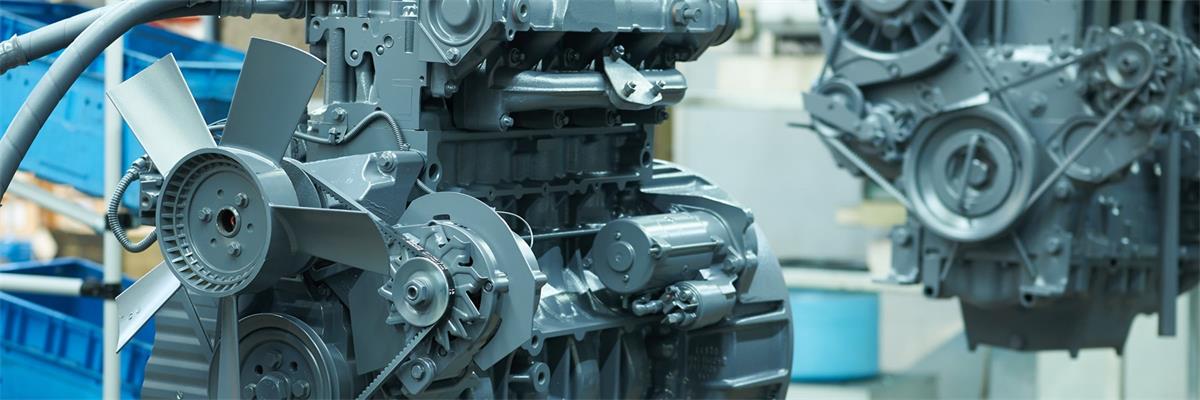
Ten factors affecting the insufficient power of diesel engines
1. The air filter is not clean
An unclean air filter will cause increased resistance, reduced air flow, and reduced charging efficiency, resulting in insufficient engine power. The diesel air filter element should be cleaned or the dust on the paper filter element should be cleaned as required, and the filter element should be replaced if necessary.
2. Exhaust pipe blocked
A blocked exhaust pipe will cause the exhaust to not flow smoothly and reduce fuel efficiency. Motivation drops. Check whether the exhaust conductivity is increased due to excessive carbon deposits in the exhaust pipe. Generally, the exhaust back pressure should not exceed 3.3Kpa, and the carbon deposits in the exhaust pipe should be removed regularly.
3. The fuel supply advance angle is too large or too small
If the fuel supply advance angle is too large or too small, the fuel pump injection time will be too early or too late (if the fuel injection time is too early, the fuel will not burn fully, if the injection time is too late, white smoke will emit, and the fuel will not burn fully), causing the combustion The process is not at its best. At this time, check whether the fuel injection drive shaft adapter screw is loose. If it is loose, re-adjust the oil supply advance angle as required and tighten the screw.
4. Piston and cylinder liner are strained
Due to severe strain or wear of the piston and cylinder liner, as well as increased friction loss due to gumming of the piston ring, the mechanical loss of the engine itself increases, the compression ratio decreases, ignition is difficult or combustion is insufficient, the lower air charge increases, and leakage occurs. Severe anger. At this time, the cylinder liner, piston and piston rings should be replaced.
5. The fuel system is faulty
(1) Air enters or blocks the fuel filter or pipeline, causing the oil pipeline to be blocked, insufficient power, and even difficult to catch fire. The air entering the pipeline should be removed, the diesel filter element should be cleaned, and replaced if necessary.
(2) Damage to the fuel injection coupling causes oil leakage, seizure or poor atomization, which can easily lead to cylinder shortage and insufficient engine power. It should be cleaned, ground or replaced in time.
(3) Insufficient fuel supply from the fuel injection pump will also cause insufficient power. Parts should be checked, repaired or replaced in time, and the fuel supply volume of the fuel injection pump should be readjusted.
6. The cooling and lubrication system is faulty
Overheating of the diesel engine is caused by a fault in the cooling or lubrication system. In this case, the water temperature and oil temperature will be too high, and the cylinder or piston ring may become stuck. When the diesel engine exhaust temperature increases, the cooler and radiator should be inspected and scale removed.
7. The cylinder head group is faulty
(1) Due to exhaust air leakage, the intake air volume is insufficient or the intake air is mixed with exhaust gas, which in turn leads to insufficient fuel combustion and reduced power. The mating surface of the valve and valve seat should be ground to improve its sealing performance, and replaced with new ones if necessary.
(2) Air leakage at the joint surface between the cylinder head and the engine body will cause the air in the cylinder to enter the water channel or oil channel, causing the coolant to enter the engine body. If it is not discovered in time, it will cause "sliding tiles" or black smoke, thus damaging the engine. Lack of motivation. Due to damage to the cylinder gasket, an airflow will rush out from the cylinder gasket when shifting gears, and blisters will appear on the gasket when the engine is running. At this time, the cylinder head nut should be tightened to the specified torque or the cylinder head gasket should be replaced.
(3) Incorrect valve clearance will cause air leakage, resulting in reduced engine power and even difficulty in ignition. The valve clearance should be readjusted.
(4) Damage to the valve spring will cause difficulty in valve return, valve leakage, and reduced gas compression ratio, resulting in insufficient engine power. Damaged valve springs should be replaced promptly.
(5) Air leakage in the injector mounting hole or damage to the copper pad will cause cylinder shortage and insufficient engine power. It should be disassembled for inspection and damaged parts should be replaced. If the inlet water temperature is too low, heat dissipation loss will increase. At this time, the inlet temperature should be adjusted to meet the specified value.
8. The surface of connecting rod bearing bush and crankshaft connecting rod journal is rough.
This situation will be accompanied by abnormal sounds and a drop in oil pressure. This is caused by the oil passage being blocked, the oil pump being damaged, the oil filter being blocked, or the oil hydraulic pressure being too low or even no oil. At this time, you can disassemble the side cover of the diesel engine and check the side clearance of the big end of the connecting rod to see if the big end of the connecting rod can move forward and backward. If it cannot move, it means that the hair has been bitten, and the connecting rod bearing should be repaired or replaced.
9. The supercharger system is faulty
At this time, for a supercharged diesel engine, in addition to the above reasons that will reduce the power, if the supercharger bearing is worn, the air intake pipeline of the press and turbine is blocked by dirt or leaks, the power of the diesel engine can also be reduced. When the above situation occurs in the supercharger, the bearings should be repaired or replaced respectively, the intake pipe and shell should be cleaned, the impeller should be wiped clean, and the joint nuts and clamps should be tightened.
10. The diesel engine electronic control system and sensors are faulty.
Failure of the diesel engine electronic control system and sensors will cause the diesel engine to "sickly run" (that is, drive home on a slope) under certain conditions. At this time, the diesel engine speed and power are insufficient, and the speed can generally only reach about 1700r/min. . The purpose is to bring the vehicle or equipment back to the repair shop for inspection and troubleshooting.






